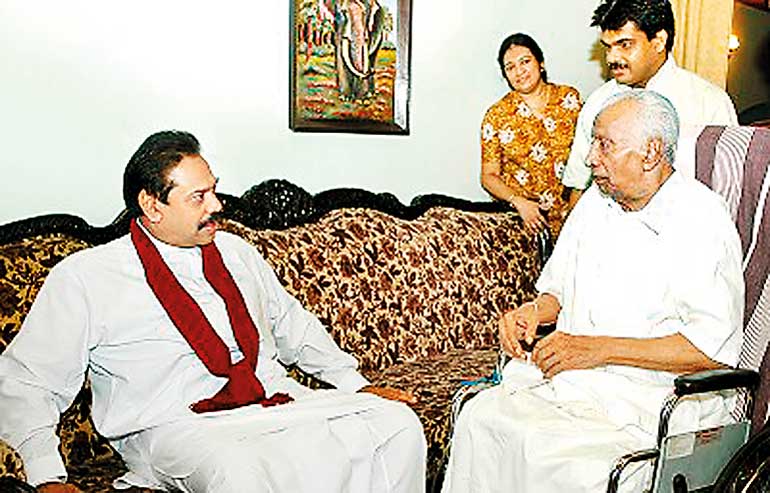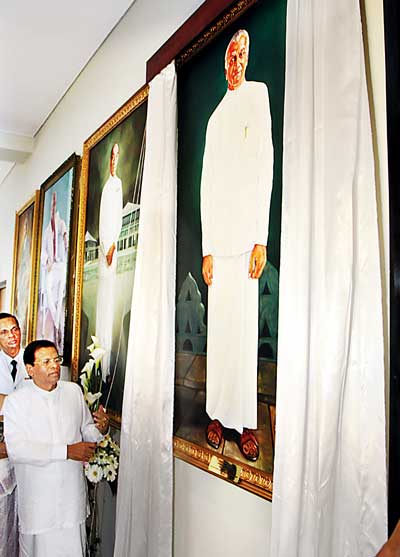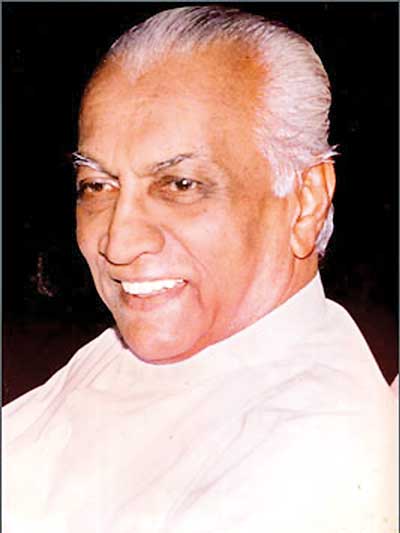Tuesday Feb 17, 2026
Tuesday Feb 17, 2026
Saturday, 20 February 2016 00:00 - - {{hitsCtrl.values.hits}}
 Former President Mahinda Rajapaksa with former President D.B. Wijetunga at his Pilimathalawa residence in June 2006
Former President Mahinda Rajapaksa with former President D.B. Wijetunga at his Pilimathalawa residence in June 2006
“I distinctly remember the day – 1 May 1993. No sooner I heard that President Premadasa had had some mishap I rushed to the Defence Ministry. When it was known that he was no more, the Prime Minister had to be appointed to act as the President. When I was walking in the May Day procession I saw Prime Minister Wijetunga seated on the pavement near the  Premadasa Stadium. He was hurriedly got down to the Defence Ministry under special security. He took the oath as acting President in the same kit he was wearing.”
Premadasa Stadium. He was hurriedly got down to the Defence Ministry under special security. He took the oath as acting President in the same kit he was wearing.”
Thus reminisced Prime Minister Ranil Wickremesinghe at a commemorative meeting held in Kandy last Sunday to mark the 100th birth anniversary of the late President Dingiri Banda Wijetunga.
He recalled that DBW held the unique record for being a Member of Parliament while being President. This happened during the week he was acting President pending the meeting of Parliament when he was chosen to be successor of President Premadasa and become the third Executive President of Sri Lanka. Ranil W, who was Minister of Industries, Science and Technology, became Prime Minister.
“Ranil, I don’t have a people’s mandate. This is the mandate given to President Premadasa. Let’s get together and continue this journey,” President DBW had told RW.
The appointment was done under Section 40 (1a) of the Constitution: “If the office of President shall become vacant prior to the expiration of his term of office, Parliament shall elect as President, one of its Members who is qualified to be elected to the office of President. Any person so succeeding to the office of President shall hold office only for the unexpired period of the term of office of the President vacating office.”
Unexpected turn of events
It was an unexpected turn of events for everyone. Here was President Premadasa giving instructions to the organisers of the May Day procession at Grandpass when a gunman shot and killed him. He had been elected President in December 1988 at an election which was characterised by a high degree of tension and crisis due to the ethnic problem in the north and east, and the partial paralysis of the Government brought out by armed groups in the south following the signing of the Indo-Lanka Accord. Major student upheavals, work stoppages and large-scale  demonstrations added to the chaos created by the Deshapremi Janatha Vyaparaya (DJV). His term was to end in 1994 and all indications were that he would contest the presidency again.
demonstrations added to the chaos created by the Deshapremi Janatha Vyaparaya (DJV). His term was to end in 1994 and all indications were that he would contest the presidency again.
President Premadasa’s selection of DBW for the post of Prime Minister was a surprise. Hailing from Udunuwara, he was an inspector of cooperatives when veteran politician A. Ratnayake picked him as his private secretary when the latter was appointed Minister of Food and Cooperatives in the post-independence Cabinet. He was with the Minister till 1956.
DBW successfully contested the Udunuwara seat from the UNP at the 1965 general election. He lost at the next election in 1970 but was re-elected in 1977. He held the portfolios of Information and Broadcasting, Posts and Telecommunications, Power and Highways, and Agriculture under Presidents Jayewardene and Premadasa before becoming Prime Minister. He was 72 when he became President.
An unassuming man
“An unassuming man who was never expected to become prime minister let along the head of state,” Reuters reported when he was appointed acting President. “The nation was surprised in 1989 when Premadasa chose Wijetunga as Prime Minister. He himself was taken aback,” the report said quoting him as having told reporters ‘This is a complete surprise to me’.
He was described as a quiet-spoken man from the village of Polgahamaga near Kandy, a devout Buddhist, vegetarian and teetotaller. He always wore a white national dress.
At a joint meeting of the UNP Working Committee and the Government Parliamentary Group held a day after he was appointed acting President, DBW was unanimously selected as the UNP nominee for presidency.
He served as President until November 1994, announced that he was not seeking re-election and gracefully bowed out to live a quiet live back home in the hills.
DBW joined the many other leaders in Parliament at the portrait gallery when his portrait was unveiled by President Maithripala Sirisena last week.